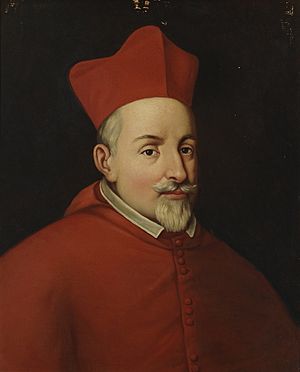Alfonso de la Cueva, 1st Marquis of Bedmar facts for kids

Alfonso de la Cueva-Benavides y Mendoza-Carrillo (born July 25, 1574 – died August 10, 1655) was an important Spanish diplomat, a bishop, and a Roman Catholic cardinal. He was often known by his title, "Bedmar." Alfonso was born in Bedmar, a town in Spain, in what is now the province of Jaén. He was the son of Luis de la Cueva-Benavides and Elvira Carrillo de Mendoza y Cárdenas.
Contents
Early Life and Career
Alfonso was born in Bedmar y Garciez, a town in the Jaén province of Spain. When he was young, he started a military career. He worked alongside his father, who was a high-ranking military leader in the Canary Islands.
After 1590, Alfonso took his father's place when his father was away. A year later, he became a captain of soldiers who used a type of gun called a harquebus. When his father died in 1599, Alfonso became the 3rd lord of his family's house. He also became the commander of a cavalry company.
Diplomat in Venice
On December 23, 1606, King Philip III of Spain made Alfonso the Spanish ambassador to the Republic of Venice. This was a very important job. The ambassador in Venice learned a lot about what was happening in Europe.
In 1610, King Philip III gave him the title of Knight of the Order of Alcántara. In 1614, when he was about 42, he became the Marqués de Bedmar. He later gave up this title when he became a cardinal.
The Venice Plan
In 1618, King Philip III asked Alfonso to help return lands that Spain had taken in Piedmont to the duke of Savoy. At this time, Venice had teamed up with France, Switzerland, and the Netherlands. They wanted to limit Spain's power.
Alfonso was told to break up this alliance. He worked with Pedro Téllez-Girón, 3rd Duke of Osuna, who was the Spanish leader in Naples. He also worked with Gómez Suárez de Figueroa, 3rd Duke of Feria, the Spanish Governor of Milan. They planned a naval attack to bring Venice closer to Spain. The plan was supposed to happen on Ascension Day in 1618. However, the French found out about it. Alfonso was protected because of his job, so he left Venice safely.
After Venice
After the plan in Venice failed, Alfonso went to Flanders. He became the president of a council there. In 1622, he received the red hat of a cardinal. Later, he became a special ambassador and advisor. He worked for Infanta Isabella Clara Eugenia, who governed the Habsburg Netherlands, and for the War Council in Flanders.
Some people believe he wrote a secret book called Squitinio della libertà Veneta. This book was published in 1612.
Cardinal and Bishop
Alfonso de la Cueva became a Cardinal Deacon on September 5, 1622. This was under Pope Gregory XV. He was about 51 years old at this time. He did not take part in the election of the new Pope Urban VIII in 1623.
He later became a Cardinal Priest. On July 18, 1633, he received the title of San Martino ai Monti. On July 9, 1635, he chose the title of Santa Balbina. He participated in the papal election of 1644.
Bishop of Palestrina and Málaga
Alfonso de la Cueva chose to become a Cardinal Bishop. On October 17, 1644, he became the bishop of suburbicarian see of Palestrina. He was officially made a bishop on October 23, 1644.
On July 27, 1648, he was named bishop of Málaga. He kept his role as bishop of Palestrina at the same time. However, he did not take charge of the Málaga diocese until 1651. He did not participate in the papal election of 1655.
Alfonso de la Cueva died in Málaga. He was buried in the Cathedral of Málaga.
See also
 In Spanish: Alonso II de la Cueva y Benavides para niños
In Spanish: Alonso II de la Cueva y Benavides para niños
 | William M. Jackson |
 | Juan E. Gilbert |
 | Neil deGrasse Tyson |

